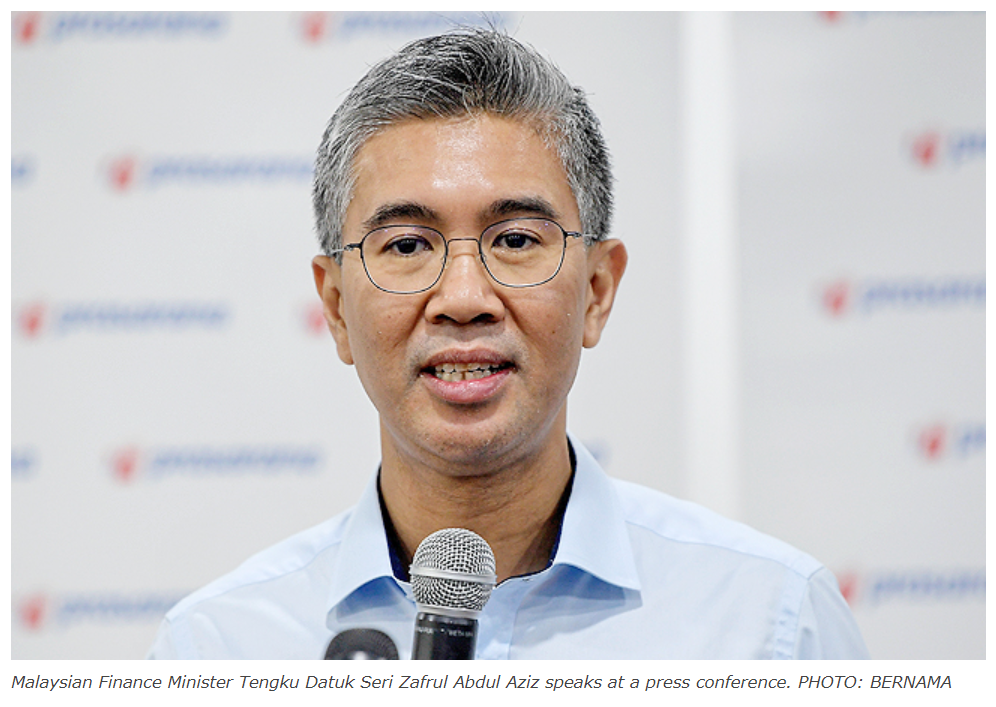Malaysia’s GDP to grow 1.2pc next year, says minister
KUALA LUMPUR (BERNAMA) – International agencies have forecast that Malaysia’s gross domestic product (GDP) in 2021 will be in the range of 6.3 per cent to 7.5 per cent, said Tengku Datuk Seri Zafrul Abdul Aziz.
The Malaysian Finance Minister said the projections are subject to Malaysia’s continued success in managing COVID-19, as well as in steering and nurturing the economy towards recovery and growth.
“As Malaysia is an open economy, whether our growth will be a U-shaped or V-shaped recovery will also depend on external factors such as the recovery of our major trading partners as well as the restoration of global supply chains,” he said in his welcoming address at Invest Malaysia 2020 yesterday.
Malaysia recorded only five new COVID-19 cases on Monday, with only 198 active cases and an approximately 98 per cent recovery rate to date.
“The rate of infections may have been low in our country, but the public has been constantly reminded against complacency.
“Everyone has been urged to continue complying with the standard operating procedures (SOPs) for various sectors and activities in order to prevent new infections in the country,” he said.
Tengku Zafrul said for 2020, the GDP has been estimated to be within the range of -3.8 per cent to 0.5 per cent by various agencies.
Bank Negara Malaysia (BNM) has projected economic growth to be within negative two per cent – 0.50 per cent, the International Monetary Fund (IMF) (-3.8 per cent) and the World Bank (-3.1 per cent). “This is wholly expected, as over 150 out of 195 countries in the world are expected to post negative growth in 2020.
“But what is most important is to ensure that a health crisis does not turn into an economic crisis. This is why Malaysia has rolled out the Prihatin Rakyat Economic Stimulus Package (PRIHATIN) and the National Economic Recovery Plan (PENJANA),” he noted.
On the health and resiliency of Malaysia’s capital markets, Tengku Zafrul said over the past decade, Malaysia’s capital markets have grown by an average of 5.1 per cent annually and are valued at over MYR3 trillion, twice the size of the country’s GDP.
This is represented almost equally in terms of total equity market capitalisation, as well as the value of bonds outstanding, he said.
Tengku Zafrul added that the FBM KLCI has also shown resilience relative to other countries as at end-June, 2020.
“Within ASEAN emerging markets, we are the best performing market. As at market close yesterday, the FBM KLCI is close to recouping over MYR200 billion in market capitalisation, taking the market cap back to levels seen at the start of the year,” he said.
In terms of the total assets managed by fund managers, Malaysia has seen an average annual growth of nine per cent to MYR823 billion as at end-2019, driven by investments in unit trust funds, which saw average annual growth of 8.7 per cent throughout the same period, with a total net asset value of MYR482 billion.
“Without a doubt, the capital markets have served as a key platform to mobilise savings and investments by efficiently allocating resources to finance businesses that create jobs and wealth,” he said.
In May alone, the country saw the average daily trading value increase by 65 per cent compared with April and recorded the highest daily trading value of RM9 billion.
“Daily volume of 11 billion shares was hit in the same month, a level not seen since 2010. This reflects investors’ optimism in the gradual reopening of Malaysia’s economy, underpinned by a low interest rate environment,” Tengku Zafrul said.
Local retail investors have bought more than MYR6 billion net as at end-June, with average daily trading value (ADV) of MYR0.9 billion, which was about 90 per cent of local institutional ADV.
“This is further supported by 128 per cent growth in ADV compared to an average annual growth of 9.7 per cent for the past three years. As they say, behind every crisis there is an opportunity.
“We believe that investors returned to the Malaysian markets in May to invest in companies that would benefit not just from the re-opening of the economy, but also from the raft of stimulus measures and tax incentives offered by the government,” he added.
In addition, Tengku Zafrul said various global rankings have also validated Malaysia’s position on numerous metrics, and are testimony to the country’s sound policies and measures.
Among them, Malaysia was ranked fourth globally in handling the COVID-19 crisis by the Toluna-Blackbox Index of Global Crisis Perceptions 2020; 12th in the World Bank’s Ease of Doing Business 2020 Report as well as in the DHL Global Connectedness Index 2019; 26th in the Global Talent Competitiveness Index 2020; and 27th in the World Economic Forum’s 2019 Global Competitiveness Index.
He said from those rankings, Malaysia’s total approved investments are a testament of the country’s position in ease of doing business.
Earlier this year, five manufacturing and services projects by foreign investors worth MYR4.6 billion were approved in sectors such as electrical and electronics as well as medical devices.
In 2019, Malaysia recorded MYR208 billion in approved investments.
Source: https://borneobulletin.com.bn/2020/07/malaysias-gdp-to-grow-1-2pc-next-year-says-minister/


 English
English




